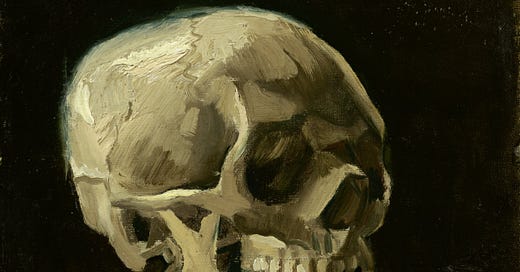Dying Without Ever Hearing Your Own Voice
"I am ready to meet my Maker. Whether my Maker is prepared for the ordeal of meeting me is another matter."
Winston Churchill’s epitaph reads:
"I am ready to meet my Maker. Whether my Maker is prepared for the ordeal of meeting me is another matter."
Your voice is the single most important thing you have.
Ideas mean nothing, without the ability to speak or write. To express something in the world is to fundamentally change it. Each of your outputs is an input into the supercomputer that is all of humankind.
When you let yourself become governed by the thoughts of others; when you misuse, or worse, deny, your voice, you are committing one minuscule act of sabotage on the world.
Added across time, and multiple by trillions, these small individual outputs cause our patterns, norms, and values to shift. Sometimes, it is in an objectively good direction. This can come from good leadership or from a shared set of moral principles that bind our voices together. We may learn from catastrophic mistakes, choose to once again uphold the sanctity and value of human life, and pass laws that give people the tools and mental fortitude to take a noble and courageous step up out of tragic circumstances.
You can imagine what happens when our collective voice leans in the other direction — war, hatred, violence, stupid thinking. The erasure and dismissal of the values, norms, and behaviors that allow us to exist at all. Risks of nuclear annihilation, anti-natalism, genocide, and rigid ideological capture are all examples.
It is akin to a computer virus that attacks one core component, risking a snowball effect that can take out the whole system.
These are the consequences of what can happen on a macro scale.
But understanding your own voice is as crucial for living a meaningful individual life as it is for society as a whole.
If you neglect to find your own voice, you become the wind in someone else’s sail. Your body exists. It moves through the world. But your actions, motivations, ideas, and values, aren’t yours.
The reason I included the Churchill quote above, is because, for all his faults and glories, he understood who he was. He recognized his own voice; and how to express his singular spirit in the world.
What will your epitaph read?
If you sense that your voice is lost to you start by examining your actions.
-Are you expressing your true thoughts and opinions, or are you neutering yourself to avoid displeasing those around you?
-Are you able to articulate yourself in a way that is both respectable and honest?
-Are you reevaluating your ideas and conceptions as you grow older, or are you stuck in the same patterns of thought that you had a decade ago?
-Are you actively pursuing a path in life that will bring you meaning, or are you being pushed in a different direction by others?
Many people, if they’re being honest with themselves, will answer “no” to all or some of these questions.
And it makes sense why.
We’re constantly being pulled away from our own voices. We’re distracted by social media, addicted to the newest show on Netflix, and told that the only way to live a happy and meaningful life is to commit to a very specific path.
And the result over time…
We reach the end of our lives and finally start to question who we are.
I cannot think of a worse fate.
This is why I dedicate at least 30 minutes each day to writing, and 30 minutes each day to reading. I am hungry for new ideas, and to challenge my preconceptions and the wisdom of my personal experience.
I seek to learn from strangers and absorb as much as I can, the endless inputs and sensations of the world around me.
I keep a close circle; of people who admire my strengths, and are willing to talk about my weaknesses.
You don’t need to do what I do, but you need to be doing something. You might find your voice in the quiet of nature, pacing around your apartment recording your thoughts on your phone, or screaming on stage in a heavy metal band.
But you need to know who you are and why you’re here.
The world needs it.
You need it.
At the end of it all, you’ll at least be able to say, “It was a hell of a ride, and I did was I was put on this Earth to do.”
With love,
-Joe








A great read and a great message!
I agree that there is great danger in blindly repeating what the collective has already said and maintaining the status quo. But there is also great danger in not having anything in common with the collective, to the point where the same language is not shared anymore. Perhaps our best bet is to try to become as fully conscious as possible.